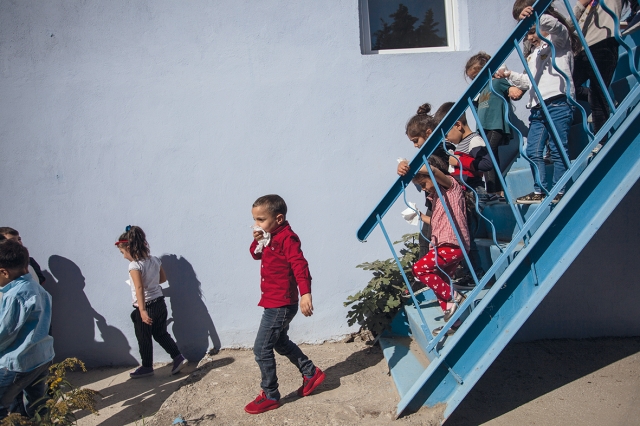Are Georgian Kindergartens Safe?
In 2016, the Georgian government voted in the first law related to the regulations of kindergartens, and has since been committed to developing new standards in terms of programs, health and hygiene, child development, pedagogy and infrastructure. While the first four standards are now elaborated, the question of safe infrastructure has been rather overlooked, especially in terms of preparedness for natural hazards such as landslides, floods and fires.
The need to create and comply with safety standards is a pressing matter, stressed by UNICEF and by government statements in the aftermath of natural hazards; but no substantial efforts have so far been made in this direction.
To fill this gap, Civitas Georgica, together with the Georgian National Environmental Agency and the Polish Center for International Aid, since 2018 have reviewed the safety of 128 Georgian kindergartens in Dusheti, Tianeti, Kazbegi, Gardabani, Mtskheta, Keda, Khulo and Shuakhevi. Altogether, these kindergartens serve 7517 children.
The team was composed of Polish and Georgian experts on safety issues and risk assessment and of local engineers, geologists and hydrologists. In 2019, they developed recommendations for technical and organizational solutions for kindergartens and worked to improve the level of knowledge and competence of these issues among kindergarten employees and government authorities.
The final conference presenting the findings and outcomes of this two-year project will be organized in Tbilisi in November 2019. It will gather representatives of municipalities, of the relevant ministries, and of local and international NGOs that actively support these changes, including Save the Children, Bridge, UNICEF and representatives of the Polish Center of International Aid, as well as representatives of Georgian media and diplomatic staff. Ideally, the carefully-developed standards will be introduced as new regulations by the end of the year.
Ahead of the conference, GEORGIA TODAY got access to an exclusive interview with Giorgi Meskhidze from Civitas Georgia, interviewed by Weronika Rzezutka, former media officer at the Polish Center of International Aid.
How did you select the kindergartens for this project? Most of them are in small villages in Georgia.
The National Environment Agency gave us a list of dangerous municipalities from the point of view of different natural disasters. Fire can happen everywhere, but flood, avalanches and earthquakes are more peculiar to the rural-mountainous regions. But truly, we had quite a diverse sample; Kazbegi is a very mountainous municipality with seven kindergardens, Gardabani is a rather big municipality with more than 40 kindergardens, we have three municipalities in mountainous Ajara, from which we have the biggest number of ecological migrants in Georgia.
Shouldn’t it be the work of ministries and municipalities to develop safety standards for kindergartens?
Indeed, but this aspect of the quality improvement of kindergartens was nevertheless neglected in comparison to the other standards, partly because of the lack of knowledge of the authorities, and of their organization. The development of safe infrastructure standards is actually in the hands of the Ministry of Economy, so they obviously have limited experience when it comes to natural hazards and disasters. At a smaller scale, municipalities have very limited means to properly assess and respond to potential safety risks since the fire service is not under their control. In Europe, firemen inspect kindergartens themselves, but here in Georgia, only gas and electricity people are coming. So that’s why we took over, together with our Polish partners.
The project includes trainings for kindergarten staff, municipalities and other local and national actors. Why didn't you simply focus on renovating the kindergarten?
You can, of course, build new buildings, but who will maintain them? We need people to learn and to understand how to take care of them, what details to look for and what direction to take. After this project, we hope municipalities will have the whole picture of what is going on in the kindergartens. It is ultimately about capacity building, also for teachers and parents.
You also worked to develop new standards for infrastructure, which you hope will be integrated into the 2016 law as new regulations. How will you proceed?
When we saw that there were no detailed standards on the question of infrastructure in the 2016 law, we realized we would have to lobby the authorities to do more. It was also an opportunity to cooperate with our Polish partners to bring European expertise into this project. We established a working group composed of representatives of ministry, municipalities, preschools and other NGOs active in the field of disaster risk reduction. Policy-makers were informed and involved in our activities from the beginning, and hopefully, the recommendations will be adopted by the end of the year.
This two-year project is now coming to an end. What are your impressions of the work done?
We have met our objectives but there’s still a lot to be done. People and infrastructure are more ready than before, but hopefully, no natural disaster will happen anyway. Now the next challenge is to convince the government to adopt the recommendations and to discuss what needs to be done and who will be in charge.
Besides safety, what still needs to be improved in preschool education?
Recently, the government passed new legislation requesting teachers to be prepared to provide first medical aid. We already received requests from municipalities to help them train the teachers. We are also supporting the establishment of a National Preschool Association in Georgia, uniting now 42 municipalities, meaning over 700 kindergartens. The idea is that in one or two years, kindergartens will be able to lobby for their interests without the help of Civitas. There is still a lot to do in this regard, so we continue to work closely with them to improve their capacity.
By Lorraine Vaney
Image source: GT Kindergartens Adam Rostkowski











